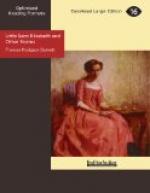When she found herself on the street again, her long lashes were heavy with tears.
“If no one will buy them,” she said, “what shall I do?”
She walked a long way—so long that she was very tired—and offered them at several places, but as she chanced to enter only respectable shops, the same thing happened each time. She was looked at curiously and questioned, but no one would buy.
“They are mine,” she would say. “It is right that I should sell them.” But everyone stared and seemed puzzled, and in the end refused.
At last, after much wandering, she found herself in a poorer quarter of the city; the streets were narrower and dirtier, and the people began to look squalid and wretchedly dressed; there were smaller shops and dingy houses. She saw unkempt men and women and uncared for little children. The poverty of the poor she had seen in her own village seemed comfort and luxury by contrast. She had never dreamed of anything like this. Now and then she felt faint with pain and horror. But she went on.
“They have no vineyards,” she said to herself. “No trees and flowers—it is all dreadful—there is nothing. They need help more than the others. To let them suffer so, and not to give them charity, would be a great crime.”
She was so full of grief and excitement that she had ceased to notice how everyone looked at her—she saw only the wretchedness, and dirt and misery. She did not know, poor child! that she was surrounded by danger—that she was not only in the midst of misery, but of dishonesty and crime. She had even forgotten her timidity—that it was growing late, and that she was far from home, and would not know how to return—she did not realize that she had walked so far that she was almost exhausted with fatigue.
She had brought with her all the money she possessed. If she could not sell the jewels she could, at least, give something to someone in want. But she did not know to whom she must give first. When she had lived with her Aunt Clotilde it had been their habit to visit the peasants in their houses. Must she enter one of these houses—these dreadful places with the dark passages, from which she heard many times riotous voices, and even cries, issuing?
“But those who do good must feel no fear,” she thought. “It is only to have courage.” At length something happened which caused her to pause before one of those places. She heard sounds of pitiful moans and sobbing from something crouched upon the broken steps. It seemed like a heap of rags, but as she drew near she saw by the light of the street lamp opposite that it was a woman with her head in her knees, and a wretched child on each side of her. The children were shivering with cold and making low cries as if they were frightened.
Elizabeth stopped and then ascended the steps.
“Why is it that you cry?” she asked gently. “Tell me.”
The woman did not answer at first, but when Elizabeth spoke again she lifted her head, and as soon as she saw the slender figure in its velvet and furs, and the pale, refined little face, she gave a great start.




